marc a. j. fortier's
LES CAVALEURS
Painter
and sculptor Marc André Jacques Fortier was born in Montreal
in 1961. Since his first exhibition in 1986, his painting and
sculptures have been exhibited widely in Canada, the United
States and France. Among his best known public works are the
fountain at the Corporation de gestion de marchés publics
de Montréal (1996) and the mural at the Burrard Commercial
Centre in Vancouver, BC (1988). He has distinguished himself
as an artist of immense talent and originality by winning First
Prize, “The Art of the Automobile,” sculpture, Toronto,
1999 and the prestigious Bronze Palm Medal, Biennale de Paris,
1993. In 1992 Fortier received a grant from the Ministry of
Cultural Affairs of Quebec. His oeuvre is extensively exhibited
internationally and is part of permanent collections including
that of the Bata Museum, Toronto, the Armand Bombardier Museum,
Montreal, the Municipality of Laval (Quebec), the Municipality
of Terrebonne (Quebec), the Claridge-Bronfman Collection, Montreal,
the Richmond Art Museum, Richmond (British Columbia), and the
Royal Canadian Mint Collection in Ottawa. His works have also
found permanent homes in many private collections around the
world.
Woman behind Man
bronze sculpture, 10th ed, 32"x22"x17", 2004
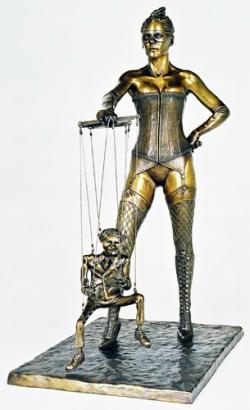 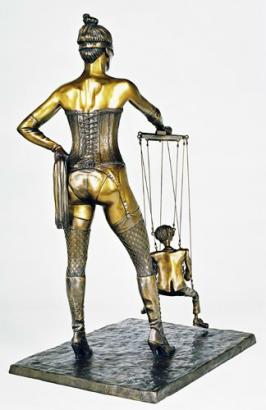 |
Sex,
sexy, sexual, kinky, fetish, erotic, libidinous, hot stuff,
provocative, shady, bawdy, daring, dirty, earthy, foul, gross,
hot, immodest, indelicate, indiscreet, inelegant, juicy, lewd,
lurid, naughty, obscene, off-color, offensive, provocative,
purple, racy, raw, ribald, salacious, salty, sizzling, smart,
smutty, spicy, suggestive, wicked. These are some of the words
uttered by the public upon viewing Marc A. J. Fortier’s
exhibition at the
Berensen Gallery this past spring.
The fact of the matter is that in a Montreal plagued this past
spring and summer by very commercial and boring exhibits, Fortier’s
showing was one of the best and certainly the most refreshing.
Woman behind Man
oil on canvas, 89" x 49", 2004
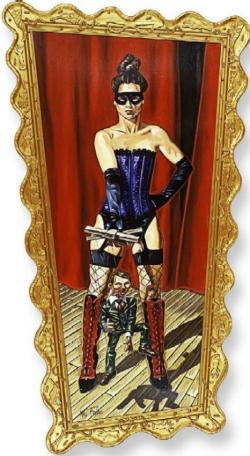 |
Those
who are compelled to define the style of every artist could
pigeonhole Fortier’s work as classical. I prefer to acknowledge
his talent and strong feel for matter, form and color. Simply
said, this artist uses his tremendous technical ability to communicate.
Through his work, Marc A. J. Fortier draws from his life-experience
to narrate his own story in ways that convey his emotions, ideas
and opinions. Fortier has a very powerful and distinct voice
that is sometimes surprising in an artist of his age. Speaking
clearly and loudly, his latest exhibition refreshes because
he has something to say -- or perhaps something to get out of
his system-- and he meets his aims immediately and directly.
Yes, his exhibition is about sex and the relationships between
men and women but what ultimately stands out in Fortier’s
work -- and in this presentation in particular-- is his message.
Unlike many other artists, he is not trying to please anybody
in order to bust sales; his retrospective collection is cohesive
and confident and stands on its own merits.
Feminists
may dismay that he is setting women back 50 or 60 years but
in point of fact he is telling us something we do not want to
admit in our politically correct world: things are never black
or white.
Woman
behind Man (sculpture and painting) mark the genesis of
the exhibit and according to Fortier, he began the work with
this image, first conceiving the sculpture followed by the oil
on canvas. And these are not the only pieces that deal with
this theme. Women dressed in corsets - oh la, la! Les corsets,
les corsets -- are symbolic of sexual oppression but also connotative
of earthy sensuality. However, I would not read Fortier’s
pieces as one or the other for these are neither sensual or
alluring women. They look more like beast tamers -- very strong
and obviously relishing their authoritarian position as evidenced
by their mirthful control of the male marionettes. Could Fortier
be alluding to the kind of ruthless and controlling female that
looks like a woman but behaves like a man? They really exist,
you know? The artist seems to assert the adage that there are
indeed different strokes for different folks. Some men are happy
with this kind of woman, a state of affairs affirmed by the
marionette in the sculpture with a big smile on its face, and
some are not so happy, borne out by the marionette in the painting
that bears a sad expression.
There
are two very cute paintings in the show. Pug on Leash
and Poodle on Leash represent two pure-breed dogs out
for a walk with their masters. The innocent and juxtaposed nature
of these images suggests a reversal of roles. The poodle stereotypically
belongs to the feminine world, the pug to the masculine. The
man wears conservative, non descript pants and shoes, the woman
is attired in the same fishnet stockings and high heel, laced-up
boots as the character in Woman behind Man. The dogs,
under the rein of their masters and unable to bark, run, sniff,
or mate as they wish, reflect the strict control exerted over
them and their environment. While these are personal interpretations,
they serve to illustrate the provocative capacity so characteristic
of Fortier’s work in general and this exhibition in particular.
Fortier says he is searching for balance, that he wants to show
both sides of the coin in order to empower the viewer with her
own awareness and appreciation.
Pug on Leash
oil on panel, 37” x 41”, 2004
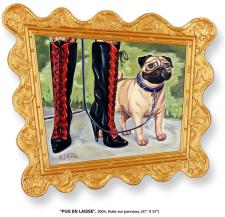 |
|
Poodle on Leash
oil on panel, 40” x 36”, 2004
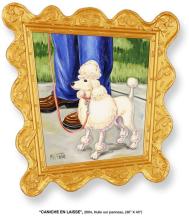 |
|
Also
appearing in this show is a re-worked version of his Happiness
Bouquet, a companion theme frequently featured in his exhibits.
In it the viewer finds many objects deemed desirable to achieve
happiness. Vintage Fortier, we are once again invited to reflect
upon the superficial and vain qualities of greed and power.
Signature vintage Fortier, he cannot hide his opinion on the
subject.
Happiness Bouquet
oil on panel, 60” x 59”, 2004
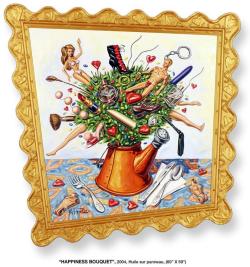 |
In
a softer mood and in a vive la différence! kind
of way, Fortier elegantly emphasizes those important differences
that make us attractive to the opposite sex.
Woman
oil on panel, 60” x 45”, 2004
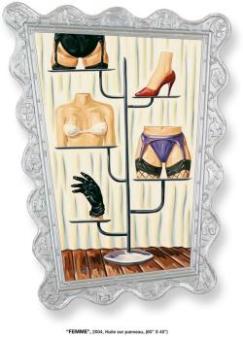 |
|
Man
oil on panel, 60” x 45”, 2004
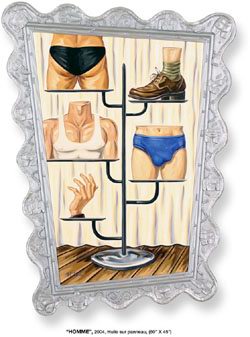 |
|
Family
Balance, one of my favorite pieces in the exhibition, represents
the need for balance in a family regardless of the conformation
or inter-dependence of its members. The sculpture captures this
idea quite haphazardly and underscores the fragile equilibrium
of family dynamics that continuously changes and shifts.
Family Balance
bronze sculpture, ed. 8, 20” x 11” x16”
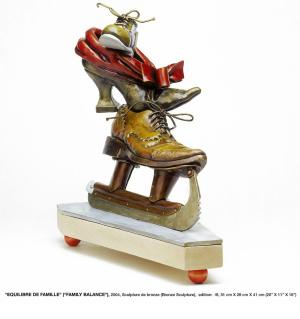 |
The
shoe, whether it appears in a sculpture such as Family Balance
or as a collection of shoes displayed decoratively in a painting,
is a recurring motif in Fortier’s art and contrary to
what many people may think, is not a fetish. This oft revisited
image is poignantly analyzed by Marie-Andrée Brière
in 1998:
In
Marc A. J. Fortier’s work, the shoe is a recurring
iconographic symbol. It punctuates the artist’s earliest
paintings and reveals a certain state, namely that of the
shoe owner. A dialogue is established in the work between
the shoe and the staged character. The shoe unmasks its
owner, identifying him, underlying his social status, his
tastes, his power and his frailty as well as his ambivalence.
The foot hiding in the shoe does not show all the discomfort
that lies within!
Marc
A. J. Fortier has a great sense of humor which he constantly
shares with the public. He jokingly pays homage to Magritte
with his composition Clin d’oeil à
René Magritte.
Clin d’oeil à René Magritte
oil on panel, 31” x 36”
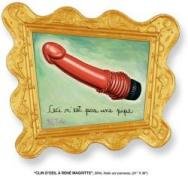 |
|
Ceci n’est pas une pipe
René Magritte, 1929
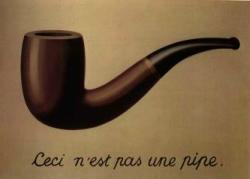 |
|
And
he teases the viewer with Toys.
Toys
oil on panel, 34” x 59”, 2004
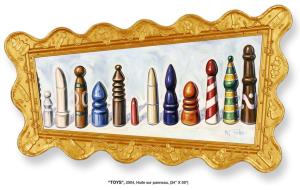 |
Despite
its innocent title, the phallic shapes portrayed in Toys
are unmistakable. Fortier points out contextually that surrounded
as it is by all the other pieces in the exhibit, Toys
may impact or even shock the viewer. Placed on its own in any
living room, it is just a beautiful study of shapes in different
colors and sizes presented in a well organized horizontal composition.
The same statement could be made for Dildos although
the not so innocent subject matter is revealed in the title.
Oh well, so much for prudery . . . !
If
the progenitor of the collection presented at the Berensen gallery
was the somewhat unsettling, ruthless and controlling Woman
behind Man, I chose Love and Cup-and-ball as the
show-closer. The manner in which the softness of the bed tenderly
spills out of the canvas, the perfect balance in the saturation
of modulated complementary colors, the beauty, solidity, fit
and symbolism of the spooning cup-and-ball, and of course the
chocolate bar - all speak to me of happiness, recovered balance
and being in love.
Love and Cup-and-ball
oil on panel, 31 x 25 inches, 2004
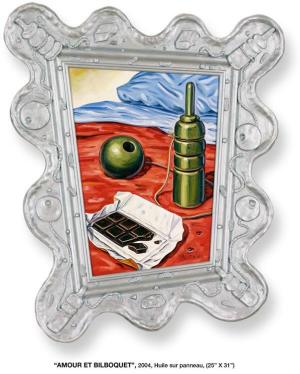 |
Happy
to know that the exhibit was a success and that there are serious
collectors who appreciate this talented, outspoken and uninhibited
artist. Chapeau to the Berensen Gallery!